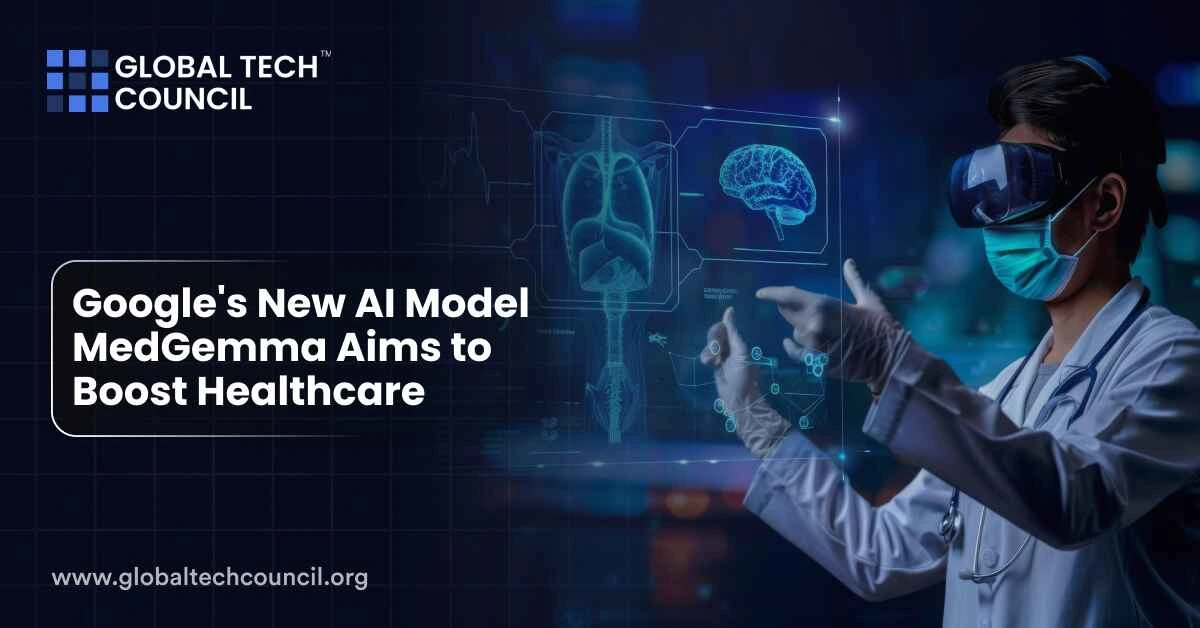
Google is taking a major step in AI for healthcare with the launch of MedGemma, its latest AI model designed to support medical professionals and researchers. MedGemma aims to improve how medical data—like images and text—is understood and used in real-world healthcare. This article explains what MedGemma is, why it matters, how it works, and what it means for the future of medical technology.
What Is MedGemma?
MedGemma is Google’s new AI model created specifically to help with medical applications. It’s built on top of the Gemma 3 architecture and comes in two main versions:
- MedGemma 4B — This version handles both images and text, making it useful for interpreting medical scans, reports, and other clinical documents.
- MedGemma 27B — This is a text-only version that focuses on understanding and summarizing complex medical information, which is especially helpful for tasks like clinical decision support and summarizing patient notes.
Google built MedGemma with the goal of making AI more helpful and accessible in healthcare settings, allowing doctors, researchers, and developers to use AI to enhance their work.
Why Did Google Build MedGemma?
Healthcare generates a massive amount of data every day—ranging from patient notes to medical images—and making sense of it all can be challenging. Google’s MedGemma aims to help by offering an AI tool that can analyze and understand this data faster and more accurately.
By providing MedGemma as an open-source model, Google hopes to give developers and researchers the tools they need to build better healthcare applications, from improved diagnostics to more efficient patient care.
How MedGemma Works
MedGemma uses machine learning techniques to process and understand medical information. With its multimodal capabilities, MedGemma 4B can look at both text and images at the same time, offering a more complete understanding of a patient’s health data. MedGemma 27B, meanwhile, is built to analyze text-based information, helping to summarize medical records or answer questions based on clinical notes.
These models are not intended for direct clinical use out of the box. Instead, developers can adapt and fine-tune them to meet specific healthcare needs, ensuring that any AI solution built on MedGemma is safe, accurate, and aligned with medical standards.
Benefits of MedGemma for Healthcare
MedGemma offers several advantages that can help medical professionals and researchers:
- Better Understanding of Medical Images — MedGemma 4B can assist in interpreting images like X-rays, MRIs, and pathology slides.
- Summarizing Medical Notes — MedGemma 27B can help condense long patient records into concise summaries.
- Supporting Clinical Decisions — By analyzing large volumes of text and images, MedGemma can provide insights that aid in diagnosis and treatment planning.
- Flexible Integration — Developers can customize MedGemma to work with different healthcare applications, making it a versatile tool for various needs.
Key Features of MedGemma
| Feature | Description | Why It Matters | Example Use Case |
| Multimodal Analysis | Processes images and text together | More comprehensive insights | Diagnosing based on X-rays and reports |
| Text Summarization | Condenses lengthy medical documents | Saves time for clinicians | Summarizing patient records |
| Clinical Reasoning | Understands medical questions and answers them | Supports clinical decisions | Suggesting treatment options |
| Open-Source Model | Freely available to developers | Encourages innovation | Building custom health apps |
How MedGemma Stands Out
Compared to other AI models, MedGemma is tailored specifically for healthcare. While many AI models can process text or images, few can handle both seamlessly and adapt to the complex language of medicine. MedGemma’s ability to analyze medical images and text together gives it an edge in creating more accurate and useful insights.
Another key advantage is its open-source nature. By sharing MedGemma with the developer community, Google encourages collaboration and innovation, which can lead to faster improvements in healthcare technology.
MedGemma vs General AI Models
| Feature | General AI Models | MedGemma | Why It Matters |
| Domain Expertise | General knowledge | Specialized in healthcare | More relevant insights for doctors |
| Multimodal Support | Often text-only or image-only | Processes both text and images | Better at understanding patient data |
| Customization | Limited in healthcare | Easy to fine-tune for medical use | Tailors AI for specific needs |
| Open-Source Access | Varies by provider | Freely available on platforms | Encourages rapid development |
Conclusion
MedGemma represents an important step in making AI more useful for healthcare. With its ability to understand both text and images, it can help bridge gaps between different types of medical data. This could lead to better diagnostic tools, improved patient care, and more efficient healthcare systems.
However, it’s important to remember that MedGemma is not a clinical-grade product by itself. Developers and healthcare providers need to validate and customize it before using it in real-world medical settings. But as a foundation, MedGemma has the potential to accelerate the development of safe and effective AI-powered healthcare solutions.
If you’re interested in learning more about AI and how it’s transforming industries like healthcare, consider exploring Deep Tech Certification from Blockchain Council. For those curious about working with large datasets and analytics, Data Science Certification is a great way to build essential skills. And if you’re looking to integrate AI into your marketing and business strategies, the Marketing and Business Certification can help you stay ahead of the curve.